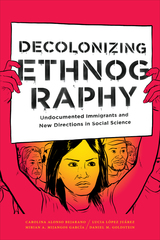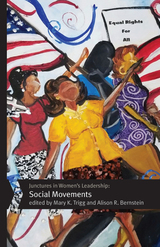3 books by Alonso Bejarano, Carolina

Decolonizing Ethnography
Undocumented Immigrants and New Directions in Social Science
Carolina Alonso-Bejarano, Lucia López Juárez, Mirian A. Mijangos García, and Daniel M. Goldstein
Duke University Press, 2019
In August 2011, ethnographers Carolina Alonso Bejarano and Daniel M. Goldstein began a research project on undocumented immigration in the United States by volunteering at a center for migrant workers in New Jersey. Two years later, Lucia López Juárez and Mirian A. Mijangos García—two local immigrant workers from Latin America—joined Alonso Bejarano and Goldstein as research assistants and quickly became equal partners for whom ethnographic practice was inseparable from activism. In Decolonizing Ethnography the four coauthors offer a methodological and theoretical reassessment of social science research, showing how it can function as a vehicle for activism and as a tool for marginalized people to theorize their lives. Tacking between personal narratives, ethnographic field notes, an original bilingual play about workers' rights, and examinations of anthropology as a discipline, the coauthors show how the participation of Mijangos García and López Juárez transformed the project's activist and academic dimensions. In so doing, they offer a guide for those wishing to expand the potential of ethnography to serve as a means for social transformation and decolonization.
[more]

Junctures in Women's Leadership
Business
Hetfield, Lisa
Rutgers University Press, 2016
How have women managed to break through the glass ceiling of the business world, and what management techniques do they employ once they ascend to the upper echelons of power? What difficult situations have these female business leaders faced, and what strategies have they used to resolve those challenges?
Junctures in Women’s Leadership: Business answers these questions by highlighting the professional accomplishments of twelve remarkable women and examining how they responded to critical leadership challenges. Some of the figures profiled in the book are household names, including lifestyle maven Martha Stewart, influential chef Alice Waters, and trailblazing African-American entrepreneur Madame C.J. Walker. Others have spent less time in the public eye, such as Johnson & Johnson executive JoAnn Heffernan Heisen, Verizon Senior Vice President Diane McCarthy, Wells Fargo technology leader Avid Modjtabai, Xerox CEO Ursula Burns, Spanx founder Sara Blakely, inventor Jane ni Dhulchaointigh, engineering firm President Roseline Marston, Calvert Investments President and CEO Barbara Krumsiek, and Merrill Lynch executive Subha Barry. These women, from diverse backgrounds, have played important roles in their respective corporations and many have worked to improve the climate for women in male-dominated industries.
This is a book about women who are leading change in business. Their stories illuminate the ways women are using their power and positions—whether from the middle ranks or the top, whether from within companies or by creating their own companies. Each case study in Junctures in Women’s Leadership: Business includes a compelling and instructive story of how a woman business leader handled a critical juncture or crisis in her career. Not only does the book offer an inspiring composite portrait of women succeeding in the business world, it also provides leadership lessons that will benefit readers regardless of gender.
[more]

Junctures in Women's Leadership
Social Movements
Trigg, Mary K
Rutgers University Press, 2016
2016 Choice Outstanding Academic Title
From Eleanor Roosevelt to feminist icon Gloria Steinem to HIV/AIDS activist Dazon Dixon Diallo, women have assumed leadership roles in struggles for social justice. How did these remarkable women ascend to positions of influence? And once in power, what leadership strategies did they use to deal with various challenges?
From Eleanor Roosevelt to feminist icon Gloria Steinem to HIV/AIDS activist Dazon Dixon Diallo, women have assumed leadership roles in struggles for social justice. How did these remarkable women ascend to positions of influence? And once in power, what leadership strategies did they use to deal with various challenges?
Junctures in Women’s Leadership: Social Movements explores these questions by introducing twelve women who have spearheaded a wide array of social movements that span the 1940s to the present, working for indigenous peoples’ rights, gender equality, reproductive rights, labor advocacy, environmental justice, and other causes. The women profiled here work in a variety of arenas across the globe: Planned Parenthood CEO Cecile Richards, New York City labor organizer Bhairavi Desai, women’s rights leader Charlotte Bunch, feminist poet Audre Lorde, civil rights activists Daisy Bates and Aileen Clarke Hernandez, Kenyan environmental activist Wangari Maathai, Nicaraguan revolutionary Mirna Cunningham, and South African public prosecutor Thuli Madonsela. What unites them all is the way these women made sacrifices, asked critical questions, challenged injustice, and exhibited the will to act in the face of often-harsh criticism and violence.
The case studies in Junctures in Women’s Leadership: Social Movements demonstrate the diversity of ways that women around the world have practiced leadership, in many instances overcoming rigid cultural expectations about gender. Moreover, the cases provide a unique window into the ways that women leaders make decisions at moments of struggle and historical change.
[more]
READERS
Browse our collection.
PUBLISHERS
See BiblioVault's publisher services.
STUDENT SERVICES
Files for college accessibility offices.
UChicago Accessibility Resources
home | accessibility | search | about | contact us
BiblioVault ® 2001 - 2024
The University of Chicago Press









